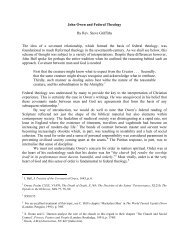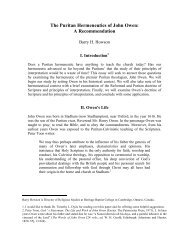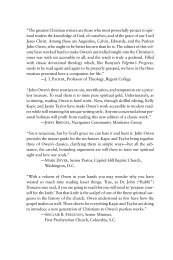M.TH. LONG DISSERTATION (LD6.1) - John Owen
M.TH. LONG DISSERTATION (LD6.1) - John Owen
M.TH. LONG DISSERTATION (LD6.1) - John Owen
Create successful ePaper yourself
Turn your PDF publications into a flip-book with our unique Google optimized e-Paper software.
<strong>John</strong> <strong>Owen</strong>’s Theological Context<br />
relating to human interactions in an historical setting. In a limited way, zoom lens<br />
historiography can provide an accurate portrayal of certain aspects of the world being<br />
studied, and the detail that a zoom lens supplies is immensely valuable. However, using<br />
only a zoom lens isolates objects and events from their broader context and can<br />
ultimately lead to a rather skewed interpretation of the facts. 227 Of course, this analogy<br />
must not be pushed too hard, lest the zoom lens picture be taken to indicate that if one<br />
focuses narrowly enough one can find a portion of the universe not related to Christ,<br />
which is impossible. Nevertheless, allowing for the limited usefulness of the analogy,<br />
although I do not deny the value of zoom lens historical study, ultimately the Christian<br />
thinker should replace the zoom lens with a wide-angle lens, in order to place the details<br />
in their full context. This requires asking normative questions on the basis of Scripture;<br />
in other words, it requires asking a broader range of expository questions in order to<br />
present a fuller picture. Hence, the problems with, for example, Alan Clifford’s reading<br />
of <strong>Owen</strong>, are not that he seeks to evaluate <strong>Owen</strong>’s theology, but rather first, that his<br />
exposition of <strong>Owen</strong> is inaccurate, and so his evaluative conclusions are skewed from the<br />
outset, and secondly, that his criteria for evaluation are, to my mind, wrongheaded.<br />
I therefore regard this dissertation as accomplishing only half the task of a<br />
Christian student of historical theology. Certainly, it is the foundational half; without<br />
careful historical exposition fair evaluation according to the wider set of expository<br />
questions is impossible. Nevertheless, such evaluation is, in my view, integral to<br />
truly Christian scholarship.<br />
227 The irony here is that Muller, Trueman, et al, in seeking to distance themselves from the theologically<br />
skewed interpretations of previous generations of scholars, themselves offer a somewhat skewed analysis<br />
when viewed from a fuller biblical perspective.<br />
68





